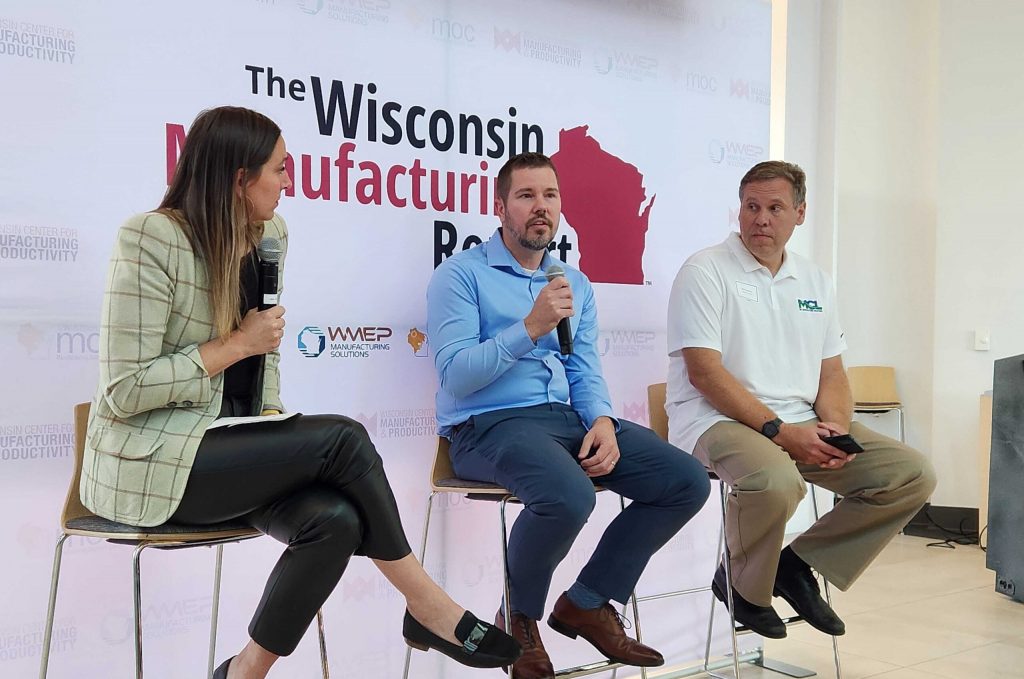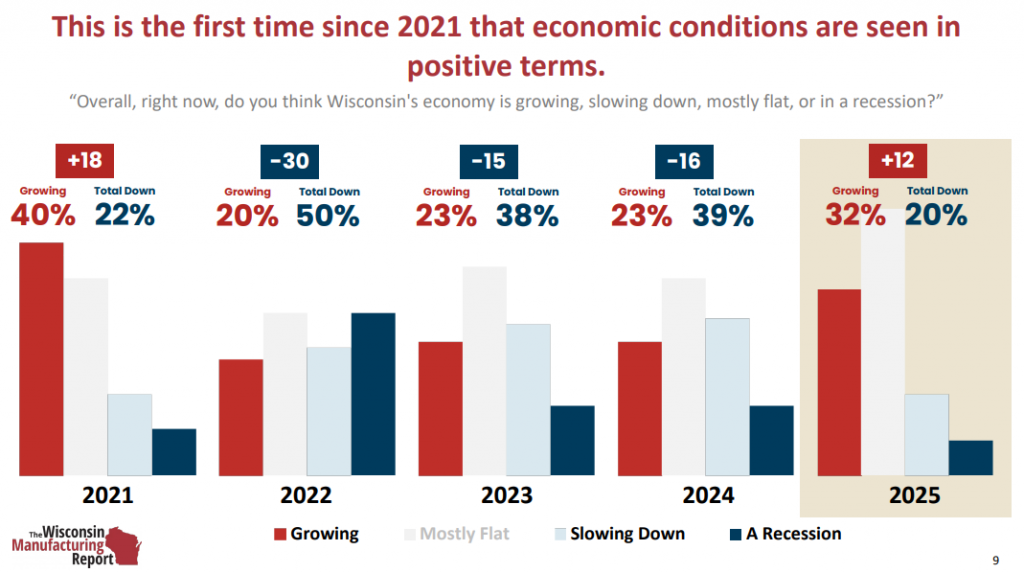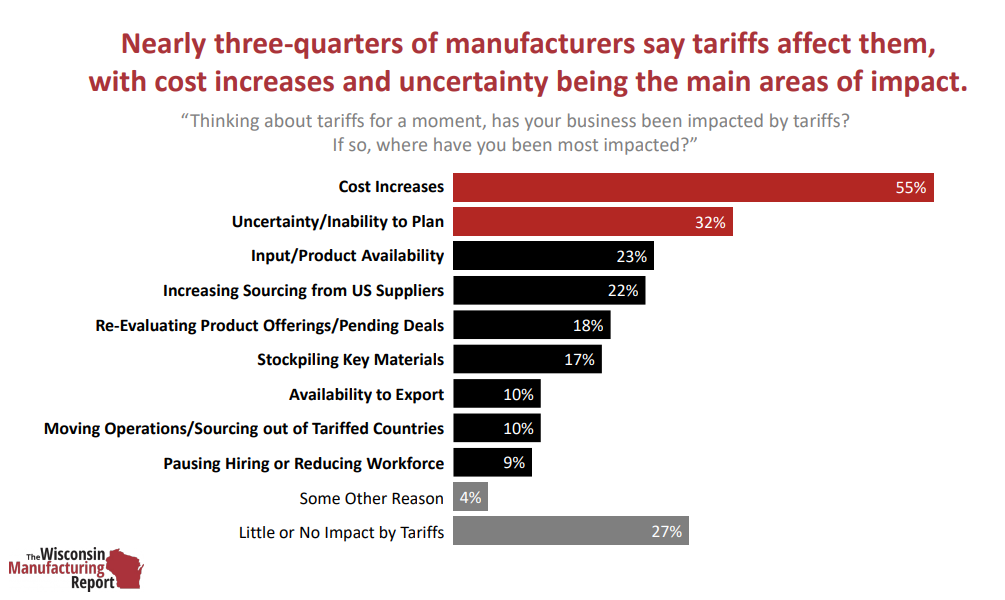Despite Tariffs, Survey Indicates Wisconsin Manufacturers Bullish on Economy
Nearly three-quarters of Wisconsin manufacturers say they've been affected by tariffs.

Speaking during a roundtable discussion on Tuesday, Sept. 30, 2025 are, from left, Kathryn Clouse with TitletownTech, Bill Feck with Packer Fastener and Mark Johnson with Village Companies. The event was held at TitletownTech in Ashwaubenon. Joe Schulz/WPR
Wisconsin manufacturers are more confident about the economy than they’ve been since 2021, despite nearly three-quarters saying they’ve been affected by tariffs.
That’s according to a new report from the nonprofit Wisconsin Center for Manufacturing and Productivity, a public-private partnership that provides resources to manufacturers. The annual report includes the results of a survey of more than 400 manufacturers and a series of focus groups.
In addition to measuring economic sentiment among manufacturers, the report provides insight into companies’ divided views on tariffs, how they’re responding to Wisconsin’s labor shortage and embracing artificial intelligence.
According to the survey, 65 percent of manufacturers say the business climate is headed in the right direction. That’s the highest since 2021, the first year of the survey, when 55 percent said the business climate was headed in the right direction.
Forty-six percent of manufacturers say the economy is mostly flat, while 32 percent say it’s growing and 20 percent say it’s either shrinking or already in a recession, the report said.
Additionally, 90 percent of manufacturers said they were confident in their own financial outlook, the report said. That’s up from 86 percent in 2021 and 2022, and 85 percent in 2023 and 2024.
“Confidence among manufacturers is clearly on the rise,” said Rob Autry, a pollster and consultant who worked on the report. “Confidence in the business climate, confidence in the economy, confidence in their own individual companies.”
But the cause for the economic optimism among manufacturers isn’t quite as clear. Autry noted economic sentiment was very low in the 2024 report, with nearly half saying the business climate was headed in the wrong direction.
With so many headlines around tariffs since the start of the year, Buckley Brinkman, executive director of the Wisconsin Center for Manufacturing and Productivity, said he was surprised to see such bullish results in this year’s survey.
He said Wisconsin manufacturers are more confident about the economy and their operations than in previous surveys, but they’re still hesitant to make investments because of market uncertainty.
“They’re ready to make investments,” Brinkman said. “They know where the opportunities are, and they just need a little bit of stability to make some really good things happen in the rest of 2025 and into 2026.”

This graphic shows changes in economic sentiment among Wisconsin manufacturers from 2021 to 2025. Graphic courtesy of the Wisconsin Center for Manufacturing and Productivity
Manufacturers split on tariffs, despite widespread affects
The new report shows 72 percent of manufacturers say tariffs affect them, with 55 percent saying cost increases have been the biggest impact and 32 percent reporting uncertainty or an inability to plan as the biggest impact.
While the vast majority of companies have been affected by tariffs, Autry said the larger manufacturers tend to be feel them the most.
Thirty-eight percent of manufacturers said tariffs and trade policy were an issue impacting their company’s success, and 23 percent listed tariffs as one of the most important issues affecting future success, according to the report.
While “almost all cited uncertain tariff policy as a cause for delayed actions,” companies are largely divided on tariffs and international trade disputes.
When asked if trade negotiations would help or hurt their business, 28 percent said they would help, 26 percent said they would hurt their business, 16 percent said neither and 21 percent said it doesn’t apply.
Brinkman said manufacturers were pretty evenly split on tariffs. Those who disliked the tariffs felt the import taxes were making it harder to do business, he said. But the companies that supported tariffs generally fell into three buckets.
“We were hearing about manufacturers where their business was being helped,” Brinkman said. “We heard about manufacturers that were really anti-China, where we’re really hoping that China would get theirs. And this third group emerged that really were true believers that the tariffs would really help to bring manufacturing to the U.S. in a substantial way.”

This graphic shows the differing ways that manufacturers report being affected by tariffs. Graphic courtesy of the Wisconsin Center for Manufacturing and Productivity
Workforce remains a top concern, companies leaning into AI
While workforce remains the biggest concern for manufacturers — with 51 percent listing finding and keeping skilled employees as one of the most important issues affecting their business — there are signs that labor challenges have been easing, according to the report.
The share of companies saying hiring is very difficult was down to 31 percent in 2025, down from 32 percent in 2024 and 44 percent in 2023, the report said. At the same time, over half of manufacturers say they are hiring, but it’s down from post-pandemic levels with fewer job openings, the report said.
Companies’ views on artificial intelligence have also shifted dramatically since 2023, according to the report. That year, 50 percent of manufacturers were not embracing AI. It was down to 26 percent not embracing AI in 2025.
Likewise, the share of companies embracing AI increased from 23 percent in 2023 to 55 percent this year, according to the report.
During a roundtable about AI on Tuesday, Mark Johnson, lead engineer for Pulaski-based Village Companies, said his company doesn’t see artificial intelligence as “just this passing trend of new technology.”
“It’s really disrupting the whole industry,” Johnson said. “And it’s really this next tech-evolution, something comparable to the internet, or to email or even the Industrial Revolution. What we want to do as a business is really lean into that and be on the cutting edge of it.”
Wisconsin manufacturers bullish about the economy despite tariffs, survey says was originally published by Wisconsin Public Radio.
If you think stories like this are important, become a member of Urban Milwaukee and help support real, independent journalism. Plus you get some cool added benefits.





















